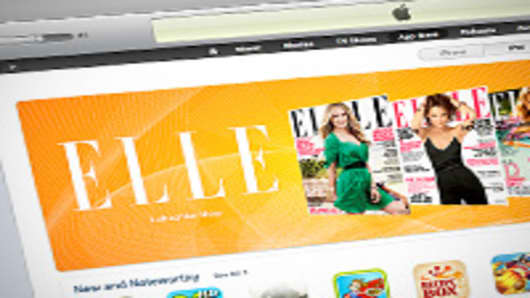Apple’s announcement appeared to do little to assuage those concerns at the nation’s three largest magazine publishers. All three — Time Inc., Hearst Magazines and Condé Nast — declined to say on Tuesday whether they planned to sell subscriptions under Apple’s new terms.
“This is an important step, but it really needs to go further,” said Nina Link, chief executive of the Association of Magazine Media. “There’s probably some sense of frustration because publishers would like it to be more flexible. I think everybody realizes it’s early in the game and there will be other tablets that may have friendlier business terms and that this may evolve.”
The new sales process could have implications beyond publishing, forcing companies like Amazon , Netflix and Rhapsody, the music subscription service, to share income with Apple for the first time. Under the new guidelines, they would be subject to the same 30 percent fee if the subscription — or in the case of Kindle books, a single title — is bought through the App Store, as many consumers are expected to do because they would not have to navigate to another Web site. Only if consumers buy subscriptions outside the App Store — for example, through the Web site of a magazine or Netflix.com — would the companies keep 100 percent of the sale price.
Amazon and Netflix declined to comment. In a sharply worded statement, Rhapsody called Apple’s conditions “economically untenable.”
In an interview, Jon Irwin, president of Rhapsody, said, “I would have no choice but to pull the app out of the App Store.” In the statement, Rhapsody said it would work with its “market peers in determining an appropriate legal and business response to this latest development.” Mr. Irwin declined to clarify what the company meant.
Apple said that it would not allow discounting outside the App Store. A company must offer the same deals to customers buying through Apple as it does through its own Web site.
Steven P. Jobs, Apple’s chief executive, said in a statement: “Our philosophy is simple — when Apple brings a new subscriber to the app, Apple earns a 30 percent share; when the publisher brings an existing or new subscriber to the app, the publisher keeps 100 percent and Apple earns nothing.”
Another issue that will most likely prove problematic for those who sell iPad apps is that Apple will no longer allow links in apps that direct consumers to an external Web site where they can buy a subscription. Consumers who wish to buy directly from a site will have to find their way there themselves.
As part of the new arrangement, publishers can provide free access to existing subscribers. This was a major concern for Time Inc., which had an arrangement with Apple to allow print subscribers to People to download the People iPad app free.
A Time Inc. spokesman said that the company viewed Apple’s announcement as a positive step, but that it might not go far enough.
“It seems like Apple is taking a step toward our position on subscription offerings,” said the spokesman, Keith Cocozza. “But the announcement also raises many questions around consumer data that we would need to work through and agree on.”
Though Apple has agreed to share some data about subscribers with magazines — provided that subscribers consent when they make the purchase — publishing companies have been pushing for unfettered access to the information.
Many in the publishing business feel that few consumers would willingly hand over that information, but Apple said the decision about whether to provide personal information would be up to consumers.
“Publishers may seek additional information from App Store customers, provided those customers are given a clear choice and are informed that any additional information will be handled under the publisher’s privacy policy rather than Apple’s,” Apple said in its statement.
On Tuesday at least two magazines, Elle and Popular Science, said they would begin selling subscriptions through the App Store. Elle is owned by Hachette Filipacchi and Popular Science by the Bonnier Corporation.
Beyond economics, Apple’s tight control over subscriber data, its insistence on keeping 30 percent of the sale price and limiting consumers’ abilities to go outside an app to buy a subscription could raise antitrust concerns.
“It is possible that regulators will look into them,” said Brian Pitz, an analyst with UBS. “And I think competition and pressure from others will push Apple to open up.”


